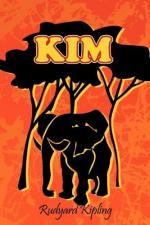They were a most mad ten days, but Kim enjoyed himself too much to reflect on their craziness. In the morning they played the Jewel Game — sometimes with veritable stones, sometimes with piles of swords and daggers, sometimes with photo-graphs of natives. Through the afternoons he and the Hindu boy would mount guard in the shop, sitting dumb behind a carpet-bale or a screen and watching Mr Lurgan’s many and very curious visitors. There were small Rajahs, escorts coughing in the veranda, who came to buy curiosities — such as phonographs and mechanical toys. There were ladies in search of necklaces, and men, it seemed to Kim — but his mind may have been vitiated by early training — in search of the ladies; natives from independent and feudatory Courts whose ostensible business was the repair of broken necklaces — rivers of light poured out upon the table — but whose true end seemed to be to raise money for angry Maharanees or young Rajahs. There were Babus to whom Lurgan Sahib talked with austerity and authority, but at the end of each interview he gave them money in coined silver and currency notes. There were occasional gatherings of long-coated theatrical natives who discussed metaphysics in English and Bengali, to Mr Lurgan’s great edification. He was always interested in religions. At the end of the day, Kim and the Hindu boy — whose name varied at Lurgan’s pleasure — were expected to give a detailed account of all that they had seen and heard — their view of each man’s character, as shown in his face, talk, and manner, and their notions of his real errand. After dinner, Lurgan Sahib’s fancy turned more to what might be called dressing-up, in which game he took a most informing interest. He could paint faces to a marvel; with a brush-dab here and a line there changing them past recognition. The shop was full of all manner of dresses and turbans, and Kim was apparelled variously as a young Mohammedan of good family, an oilman, and once - which was a joyous evening — as the son of an Oudh landholder in the fullest of full dress. Lurgan Sahib had a hawk’s eye to detect the least flaw in the make-up; and lying on a worn teak-wood couch, would explain by the half-hour together how such and such a caste talked, or walked, or coughed, or spat, or sneezed, and, since ‘hows’ matter little in this world, the ‘why’ of everything. The Hindu child played this game clumsily. That little mind, keen as an icicle where tally of jewels was concerned, could not temper itself to enter another’s soul; but a demon in Kim woke up and sang with joy as he put on the changing dresses, and changed speech and gesture therewith.
Carried away by enthusiasm, he volunteered to show Lurgan Sahib one evening how the disciples of a certain caste of fakir, old Lahore acquaintances, begged doles by the roadside; and what sort of language he would use to an Englishman, to a Punjabi farmer going to a fair, and to a woman without a veil. Lurgan Sahib laughed immensely, and begged Kim to stay as he was, immobile for half an hour — cross-legged, ash-smeared, and wild-eyed, in the back room. At the end of that time entered a hulking, obese Babu whose stockinged legs shook with fat, and Kim opened on him with a shower of wayside chaff. Lurgan Sahib — this annoyed Kim — watched the Babu and not the play.




